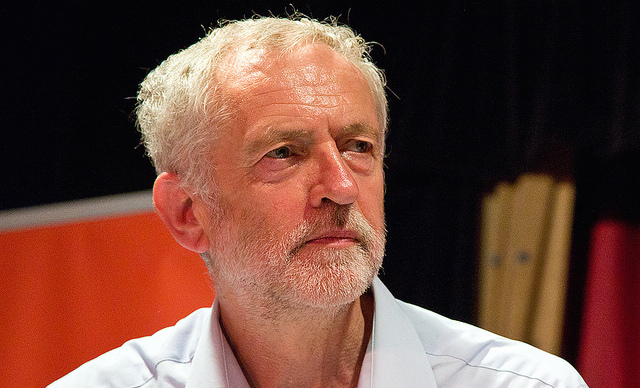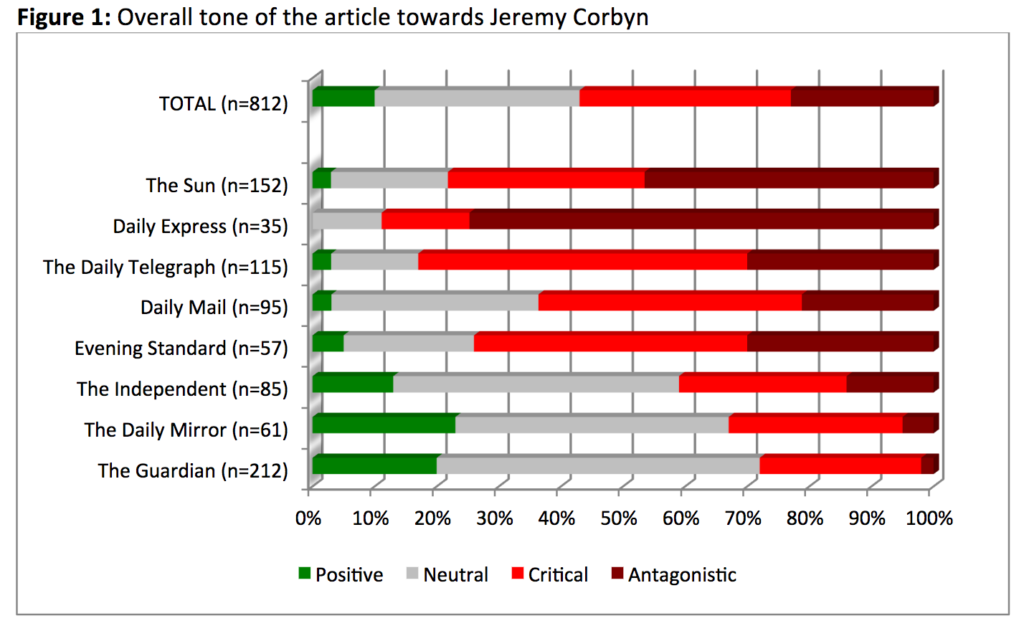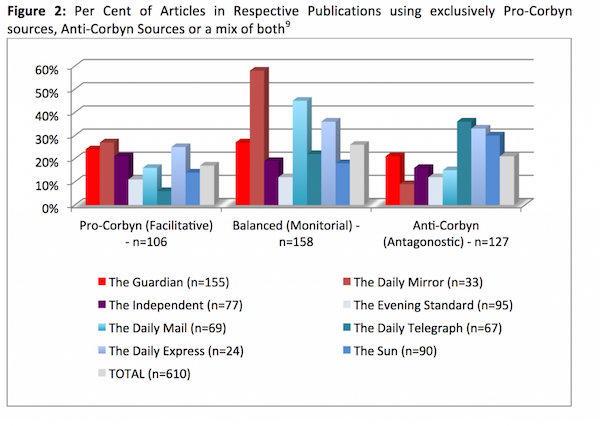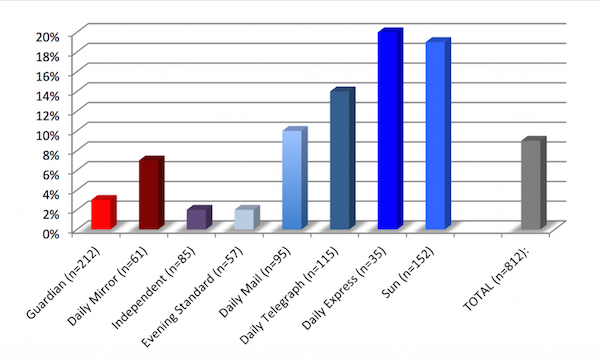From “Watchdog” to “Attackdog”: Media depictions of Jeremy Corbyn are an affront to democracy
A healthy democracy requires a watchdog in its press — not an ‘attackdog’, ‘snarling’ and ‘barking’ at an elected politician. Yet this is how Jeremy Corbyn is being treated by the media, explains Brooks DeCillia. He outlines the findings of LSE research that show how the Leader of the Opposition is being delegitimased by the British press through distortion, ridicule, and association with terrorism.

Credit: Chris Beckett CC BY-NC-ND 2.0
“Pacifist Corbyn refuses to bow,” screamed The Sun’s headline, ridiculing the Labour leader for his apparent lack of deference to the war dead during Remembrance Day ceremonies in 2015. Twitter — and the right-wing outrage media machine — exploded moments after Jeremy Corbyn stepped back from placing a wreath reading: “In memory of the fallen in all wars, let us resolve to create a world of peace.” The Sundubbed it a “snub.”
Corbyn, dressed in black and wearing a red poppy, did, of course, bend subtly after laying the wreath. But his bow wasn’t sufficient genuflection for many in the press. The Telegraph quoted an etiquette expert claiming that he didn’t bend deep enough while The Independent stressed that concerns over Corbyn’s “decision not to sing the National Anthem at a Battle of Britain memorial service” a month earlier heightened scrutiny of his performance at the war memorial.
Much of this news coverage — conspicuously — ignored that Corbyn stayed behind after the ceremonies to pay his respects directly to veterans while other politicians quickly retreated to a VIP lunch. Photos show Corbyn — away from the cameras — applauding as former soldiers marched past the Cenotaph. After the ceremony, Corbyn also attended another Remembrance Day commemoration in his constituency.
Clearly, the Labour leader has a media problem: he is the target of scorn and ridicule in so much of it. More than 50 per cent of news reporting about Corbyn is negative or blatantly antagonistic (Figure 1). That’s news coverage — the supposed bastion of journalistic neutrality. And, astonishingly, he gets blamed for his “toxic relationship with the media.” It all reads like blaming the victim of a crime.
And while the Independent Press Standards Organization (IPSO) insists that its members have a “duty to maintain the highest professional standards”, three in ten pieces in the British print media mock the leader of the opposition, scoffing at his ideas, policies, history — and, alarmingly, even his looks. And although again according to the IPSO, a healthy democracy requires a press that is “free to editorialise and campaign”, the Leader of the Opposition and long-serving MP for Islington North frequently gets reduced to the journalistic shorthand of a caricature. He is often portrayed as a clown-like figure, mocked as the ‘Jezster’ or derided as the comic political equivalent of the child-like TV sitcom character Mr. Bean with tabloid media referring to him as ‘Mr. Corbean’ repeatedly.
And so much of the news media coverage of the Labour leader is maliciously personal. A week after his election as leader, The Daily Telegraph artfully condensed all of its sneering criticisms into a sentence, describing him as “a rather dreary bearded fellow who takes pictures of manhole covers as a hobby, doesn’t drink alcohol or eat meat, and wears shorts teamed with long dark socks exposing an expanse of pale, hairy English shin.”
Repeatedly, commentary suggests that Corbyn’s sartorial and lifestyle choices make him seem weird — and decidedly unelectable. The Telegraph also mocked Corbyn’s appearance, noting that his pants and jacket did not match at the memorial service at St Paul’s Cathedral where he took so much media grief for not singing the national anthem. “The top button of his shirt was undone,” opined the news story. “He looked like a lecturer who’d woken late, got dressed in the dark, then loosened his collar to recover from the mad panting dash to the bus stop.”
Our analysis of media coverage of Corbyn found many startling findings. First, Corbyn repeatedly gets portrayed as a political transgressor who isn’t playing ‘the game’ in the way the media and the political establishment expects. While it is the role of journalists to be critical and fulfil a monitorial role, in the case of Corbyn the media transgressed into a vile attack dog journalism, a democracy unworthy.
Second, the prevalence of a negative and antagonistic tone towards Corbyn is quite staggering. During our period of analysis (September-November 2015), 54 per cent of all news articles were either negative or antagonistic towards Corbyn, which rises to 67 per cent for opinion pieces and editorials. Both figures are very high – especially for news reporting which, from a normative perspective, we would expect to be factual, impartial, and balanced.
There is obviously an ideological bias as well, with the right-wing media being more acerbic, more scornful, mocking gleefully, and attacking Corbyn on a personal level. Part of this is the amplification of the civil war within Labour whereby the anti-Corbyn Labour sources tend to outweigh the pro-Corbyn ones (Figure 2). This is especially pronounced in The Daily Express and in The Daily Telegraph.
But there is also a lot of negativity towards him in the left-wing press, considering him too left, unrealistic, and unelectable. In The Independent and The Daily Mirror, for example, discrepancies can also be observed with regards to the use of pro-Corbyn and anti-Corbyn Labour sources.
Finally, the most problematic finding is that the British media has actively delegitimised the elected leader of the UK’s largest party. This was done through scorn and personal attacks, but above all by strongly associating him with condoning terrorism.
Almost 10 per cent of the articles relating to Corbyn had a reference to Iran, Hamas, Hezbollah, IRA and/or terrorism in general (Figure 3). Linked to this was the strong depiction of Corbyn or his ideas as dangerous – a danger frame that was not only fed by journalists (9 per cent), but also by the Tories and Cameron (4 per cent), and by anti-Corbyn Labour sources (6 per cent). And although Corbyn’s own views are missing in more than half of the articles on him, when his views are reproduced they are very often taken out of context (22 per cent).
Corbyn clearly appears different from the generations of cookie cutter politicians the UK has grown used to. What UK newspapers have done — and continue to do — through depictions of the Labour leader has grown beyond a mere political question: it now also raises ethical and democratic ones because Corbyn was elected by Labour members. If newspapers care so much about public service and their readers, they might want to show them some respect — and treat Corbyn with respect and fairness.
__
Note: the full report on which this article draws on is available here. This post originally appeared on the LSE British Politics and Policy blog. It represents the views of the author and not those of Democratic Audit or the LSE. Please read our comments policy before posting.
__
 Brooks DeCillia is a PhD candidate at the LSE’s Media & Communications Department. Before coming to LSE, Brooks worked as a journalist and public broadcaster.
Brooks DeCillia is a PhD candidate at the LSE’s Media & Communications Department. Before coming to LSE, Brooks worked as a journalist and public broadcaster.








 Democratic Audit's core funding is provided by the Joseph Rowntree Charitable Trust. Additional funding is provided by the London School of Economics.
Democratic Audit's core funding is provided by the Joseph Rowntree Charitable Trust. Additional funding is provided by the London School of Economics.
From “Watchdog” to “Attackdog”: Media depictions of Jeremy Corbyn are an affront to democracy : Democratic Audit UK https://t.co/IblfDtPVFW
From “Watchdog” to “Attackdog”: Media depictions of Jeremy Corbyn are an affront to democracy https://t.co/4RfA3PbI8g
#corbynista or not, this is interesting data on the treatment of the #Labour leader in the media https://t.co/O3nEtalCET by @democraticaudit
From “Watchdog” to “Attackdog”: Media depictions of Jeremy #Corbyn are an affront to democracy https://t.co/nqgiC009fO
From “Watchdog” to “Attackdog”: Media depictions of @jeremycorbyn are an affront to #democracy https://t.co/Iw099hdblY #Labour #Corbyn
From “Watchdog” to “Attackdog”: Media depictions of Jeremy #Corbyn are an affront to democracy https://t.co/rcOkUOQS9E
From “Watchdog” to “Attackdog”: Media depictions of Jeremy Corbyn are an affront to democracy https://t.co/EUkvP0IlVl
@havantacluOTMP @democraticaudit Jeremy has always been an anarchist what does he expect in return. Nasty Party!
From “Watchdog” to “Attackdog”: Media depictions of Jeremy Corbyn are an affront to democracy https://t.co/AuYuqyPSPs
From “Watchdog” to “Attackdog”: Media depictions of Jeremy Corbyn are an affront… https://t.co/MH3Vkmjlr9 https://t.co/yvEr1k6Xx7